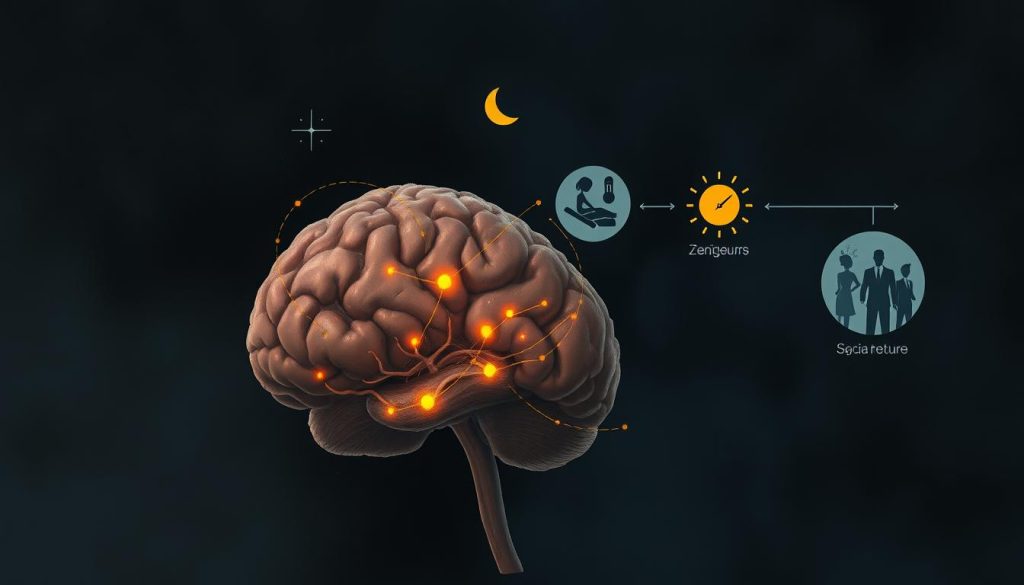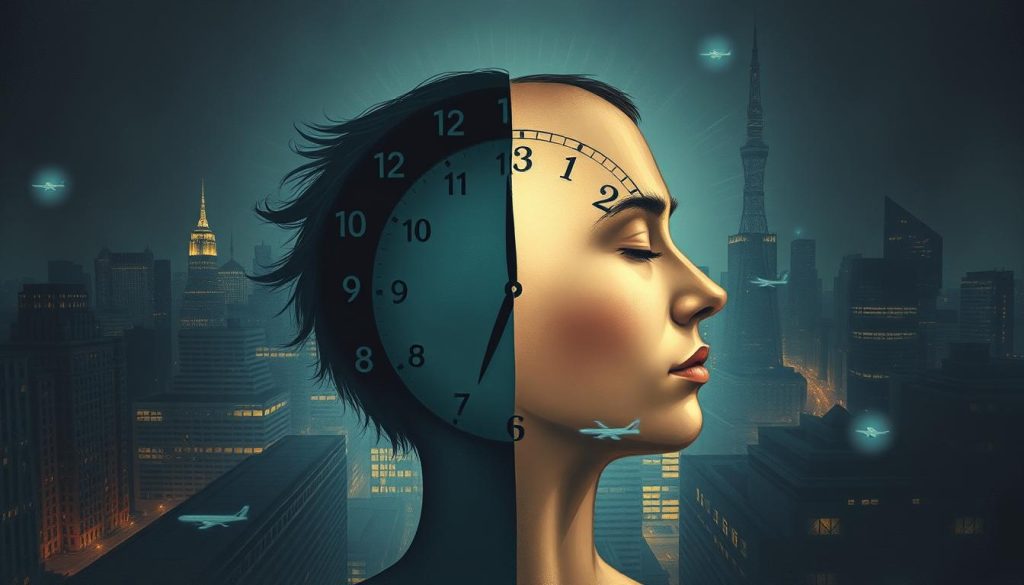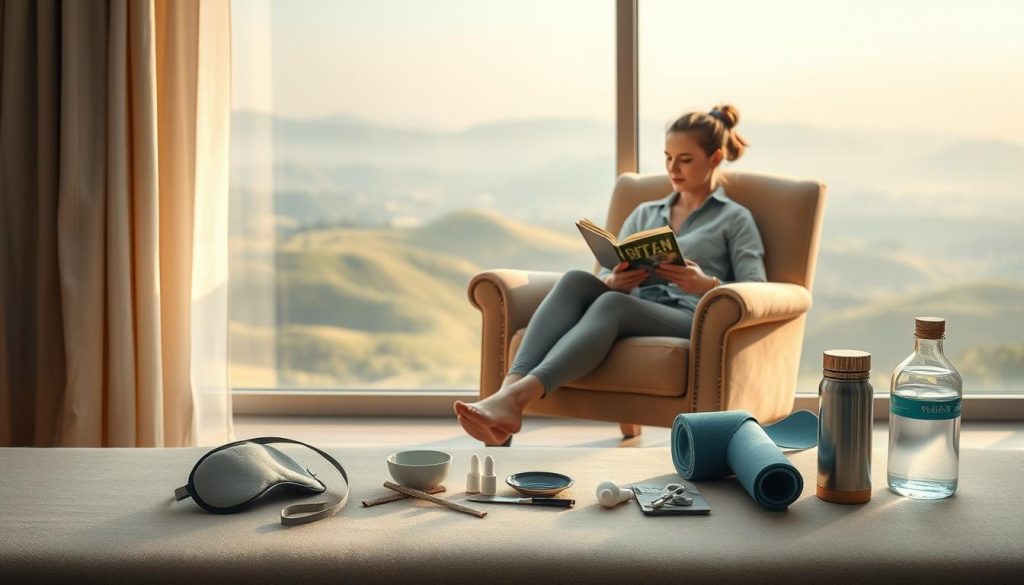Ever felt like your brain is wrapped in cotton after a long flight? That feeling isn’t just in your head. Your body is actually fighting against its own internal clock.
Traveling across time zones messes up your biological clock. This internal timekeeper controls when you feel alert, sleepy, hungry, and energized. Your body tries to stick to your home schedule, but your environment demands a new one.
Some people bounce back from jet lag quickly. Others take weeks to shake off the sleepiness and mental fog. The good news? You don’t have to suffer through travel fatigue anymore.
Knowing how your body reacts to time zone changes gives you power. With the right strategies, you can reduce disruption and feel more like yourself, faster.
Understanding Circadian Rhythm: The Body’s Internal Clock
Every human has a special timekeeper inside them. It works all day to keep your body in sync with nature. Knowing how it works is key to handling travel and time zone changes.
What is Circadian Rhythm?
Your circadian rhythm is like a 24-hour timer inside you. It tells you when to be awake and when to sleep. It’s in every cell of your body, from your brain to your liver.
This rhythm is found in almost all living things on Earth. The word “circadian” means “about a day.” Your body follows this cycle naturally, even without sunlight.
What makes you different is your chronotype. Some people wake up early, while others stay up late. Your chronotype is mostly based on your genes, but it can change a bit with age and lifestyle.

How Circadian Rhythm Regulates Sleep
Your internal clock controls your sleep with hormones. In the evening, it releases melatonin, making you sleepy. This usually starts around 9 PM for most people.
In the morning, it releases cortisol, making you alert. Your body temperature also changes in a pattern throughout the day. These changes happen automatically.
Good sleep quality depends on your internal clock. If it’s off, you might find it hard to fall or stay asleep. That’s why adjusting your body clock is important when traveling.
Factors Influencing Circadian Rhythm
Light exposure is the biggest factor affecting your internal clock. Bright light, especially blue light from the sun, tells your brain it’s time to be awake. Darkness signals it’s time to sleep.
Your daily habits also shape your internal clock. Regular meal times, exercise, and social activities help keep your body’s natural timing. Even your work schedule can change your chronotype over time.
Other factors like temperature, noise, and stress can also affect your internal clock. Travel is challenging because it changes many things at once. Knowing these factors helps you adjust your body clock better when planning trips.
Age is another factor that affects your internal clock. Teenagers tend to stay up later, while older adults wake up earlier. Understanding these changes helps you work with your body.
The Science Behind Travel Fatigue
Travel fatigue is more than just feeling tired. It’s a complex mix of biological processes that affect your whole body. Your body’s natural rhythms get disrupted, making you feel completely drained.
When you travel, your body’s internal clock gets out of sync. This struggle to adjust can cause symptoms that last for days.
Common Symptoms of Travel Fatigue
Travel fatigue brings a range of physical and mental symptoms. Even seasoned travelers can be surprised by how intense and long-lasting these effects are.
The most common symptoms include:
- Difficulty concentrating and mental fog
- Digestive problems and appetite changes
- Mood swings and irritability
- Persistent headaches
- Sleep disruption and insomnia
Many people also feel muscle aches and general weakness. These symptoms can feel worse than a typical sleepless night. It’s like being “hit by a truck.”
Why Travel Disturbance Affects Your Body
Your body has a precise internal schedule. Travel disrupts this, causing “circadian desynchronization.” This term describes the conflict between your body’s schedule and reality.
Your internal clock keeps running on your home time zone. Meanwhile, your environment demands a different schedule. This confusion affects your body’s natural processes.
The severity of jet lag depends on several factors:
- Number of time zones crossed
- Direction of travel (eastward is typically harder)
- Your age and individual sensitivity
- Previous travel experience
- Overall health and fitness level
Traveling eastward is harder because it forces your body to advance its clock. This goes against your natural tendency to stay up later.
Long-Distance Travel and Fatigue
Long-distance travel adds to sleep disruption through various stressors. You’re not just dealing with time zone changes – you’re also managing physical discomfort and environmental challenges.
Extended flights cause problems beyond jet lag. Cramped seating restricts blood flow and causes muscle stiffness. Cabin pressure changes can lead to dehydration and headaches.
Disrupted meal patterns confuse your body’s internal clock. Your digestive system expects food at specific times. Eating at unusual hours adds to the confusion.
The combination of these factors explains why crossing multiple time zones feels overwhelming. Your body must adjust to new light patterns, meal times, and activity schedules while recovering from travel stress.
The Connection Between Circadian Rhythm and Travel Fatigue
Your body’s natural timing system faces its biggest challenge when you travel quickly. It tries to adjust to new time signals, leading to travel fatigue. Your circadian rhythm and the tiredness after long trips are closely linked through complex processes.
Knowing this connection helps explain why some travelers recover quickly, while others take longer. It all depends on how your body’s master clock handles sudden changes.
How Time Zone Changes Impact Your Body
Time zone changes disrupt your body’s systems. Your brain’s suprachiasmatic nucleus is like your body’s master clock. When you travel across zones, it gets confused about the correct time.
Your body systems adjust at different speeds. Your sleep cycle might adjust in two days, but your digestive system could take a week. This can make you feel hungry at midnight or wide awake at 3 AM.

- Number of time zones crossed
- Direction of travel (eastward is typically harder)
- Your natural sleep preferences
- Age and overall health status
The Role of Light Exposure in Jet Lag
Light exposure is key to resetting your internal clock. Blue light, especially from sunlight, tells your brain it’s daytime. This is why stepping into bright sunshine after a long flight can feel jarring.
Your eyes have special cells that detect light and send signals to your brain. These signals can change your internal clock’s settings. Using light strategically can help you adjust faster.
Morning light in your new location helps shift your clock forward. Evening light can delay it. Smart travelers use this to their advantage by controlling their light exposure.
The Adaptation Process During Travel
Your body usually adjusts to new time zones at a rate of about one zone per day. This is why recovering from a long flight can take nearly a week. The adjustment process is not smooth or predictable.
During this time, you might experience:
- Fragmented sleep patterns
- Digestive irregularities
- Mood fluctuations
- Reduced cognitive performance
- Physical fatigue despite adequate rest
How quickly you adapt varies a lot. Some people adjust faster due to genetics. Others struggle more with time zone changes based on their natural sleep preferences.
The good news is that understanding this process helps you work with your body. Knowing what to expect can reduce anxiety and improve travel planning.
Strategies for Minimizing Travel Fatigue
Beating travel fatigue starts before you fly. Smart travelers prepare at least a week before. This helps your body adjust to new time zones faster.
Preparing for Travel in Advance
Start your pre-travel routine seven to ten days before. Learn about your destination’s time zone and plan your adjustment. This gradual approach helps your body adjust better.
Travel direction matters. Eastward trips cause more jet lag than westward ones. It’s harder to stay up late than to wake up early.
Bring items that help you sleep well. Pack comfortable pillows, eye masks, and earplugs. These can greatly improve your flight comfort.

Adjusting Your Sleep Schedule Before Departure
Adjusting your sleep schedule is key. Start by changing your bedtime and wake-up time by 15 to 30 minutes each day. This helps your body adjust before you leave.
For eastward travel, go to bed and wake up earlier. For westward trips, stay up later and sleep in longer. This can cut jet lag by up to 50 percent.
Stick to your new schedule once you start adjusting. Avoid going back to old sleep times. Your body needs consistent signals to adjust.
Light exposure is also important. Seek bright light in the morning for eastward travel. For westward trips, get bright light in the evening.
Importance of Staying Hydrated
Staying hydrated is crucial for travel recovery. Airplane cabins are very dry, which can lead to dehydration. Dehydration makes fatigue worse and slows down your adjustment to new time zones.
Start drinking more water a day or two before your trip. Drink at least 8 ounces of water for every hour in the air. This keeps your body hydrated during the flight.
Avoid caffeine and alcohol on the flight. They can mess with your sleep and dehydrate you. Stick to water and herbal teas to stay hydrated.
Think about your meal timing too. Eat according to your destination’s schedule, even at home. This helps your body adjust to the new time and stay hydrated.
Coping with Jet Lag: Tips for Travelers
Managing jet lag starts when you arrive at your destination. Your body needs time to adjust to the new time zone. But, you can help it adjust faster with the right techniques.
Recovery from travel fatigue is easier when you support your body’s adjustment. Focus on three main areas: creating the right sleep environment, using light exposure strategically, and making smart food choices.
Sleep Hygiene Practices While Traveling
Creating an optimal sleep environment is key for adjusting to the new schedule. Your room should signal to your brain that it’s time to rest, even if you don’t feel tired yet.
Here are essential sleep hygiene practices for travelers:
- Keep your room cool, ideally between 65-68°F
- Block out all light sources with blackout curtains or an eye mask
- Minimize noise with earplugs or white noise
- Establish a consistent bedtime routine
- Avoid screens for at least one hour before sleep
Stick to local bedtime schedules from your first night. This helps reset your internal clock faster than gradually shifting your sleep times.
Use of Natural Light to Reset Circadian Rhythm
Natural light exposure is your most powerful tool for adjusting your circadian rhythm. Light directly influences melatonin regulation, which controls your sleep-wake cycle.

- Morning sunlight works best for eastward travel
- Evening light helps when traveling west
- Spend at least 30 minutes outside during daylight hours
- Avoid bright lights 2-3 hours before local bedtime
Get outside as soon as possible after arrival. Even cloudy daylight is more effective than indoor lighting for resetting your body clock.
Dietary Choices to Combat Fatigue
What you eat and when you eat it can either help or hurt your recovery from jet lag. Your digestive system also follows circadian patterns, so meal timing plays a crucial role.
Follow these dietary strategies:
- Eat meals according to local time, even if you’re not hungry
- Choose foods rich in tryptophan like turkey, milk, and bananas
- Avoid large meals within 3 hours of bedtime
- Stay hydrated but limit fluids before sleep
- Reduce caffeine intake, especially after 2 PM local time
Some travelers find natural melatonin supplements helpful for supporting healthy melatonin regulation. However, timing matters more than dosage. Consult with a healthcare provider before using any supplements, especially if you take other medications.
Remember that recovery takes time. Most people need 1-2 days to adjust for each time zone crossed, so be patient with your body’s adaptation process.
The Role of Technology in Managing Circadian Rhythm
Digital tools now offer great support for travelers with sleep issues. Modern tech provides solutions and challenges for keeping sleep healthy while traveling. Knowing how to use these tools can greatly improve your travel recovery.
Sleep Tracking Apps
Sleep tracking apps are great for travelers. They watch your sleep and show how travel changes your rest. Apps like Sleep Cycle, Fitbit’s sleep tracking, and Apple’s Sleep app are popular.
These apps offer many benefits for travelers:
- Track sleep stages and identify disruption patterns
- Monitor how time zone changes affect deep sleep
- Provide personalized recommendations for better rest
- Record sleep debt and recovery progress
The data from these apps shows how your body reacts to travel. You can see how jet lag affects your sleep cycles. This info helps you decide when to sleep and wake up in new zones.
Light Therapy Devices for Travelers
Portable light therapy devices have changed how travelers manage their circadian rhythms. These small tools give controlled light to reset your internal clock. Light boxes, therapy glasses, and dawn simulators are now travel-sized.
When using light therapy devices, timing is key. Getting bright light at the wrong time can make jet lag worse. Most devices have apps that figure out the best light times based on your travel plans.
Look for these features in travel light therapy devices:
- Compact size and lightweight design
- Adjustable brightness levels
- Timer functions for controlled sessions
- UV-free LED technology
- Battery operation for portability
The Impact of Blue Light on Sleep Quality
Blue light from devices is a double-edged sword for travelers. Your phone or tablet might seem comforting when you can’t sleep, but the blue light they emit can stop melatonin production. This makes adjusting to new time zones harder.
Screen time before bed affects sleep. The blue light makes your brain think it’s daytime. This stops your natural sleep hormones from working right.
Here are smart ways to manage blue light:
- Use blue light filters on devices after sunset
- Have screen-free times before bed
- Choose warm lighting in hotel rooms
- Wear blue light blocking glasses in the evening
Many devices now have automatic blue light reduction features. They adjust your screen’s color based on the time. But, the best way is to limit screen time before bed.
When to Seek Professional Help
Knowing when travel fatigue is a problem can protect your health. Most people get over jet lag in a few days to a week after coming home. But, some signs mean you should see a doctor about your sleep issues.
Recognizing Chronic Fatigue Symptoms
Feeling very tired for more than two weeks after traveling is a warning sign. This kind of fatigue doesn’t get better with rest or sleep. You might always feel tired during the day.
Having trouble focusing is serious if it affects your work or daily life. Memory problems, making decisions, and feeling mentally foggy can mean your body is still adjusting to jet lag. These signs often come with physical issues like headaches or stomach problems.
Mood changes that seem too big for your travel experience are also a sign. Feeling more irritable, anxious, or depressed after trips might mean your body clock is off. Notice if it takes longer to recover each time you travel – this could mean a bigger problem.
Understanding Long-Term Effects on Health
Travelers who often cross time zones face serious health risks. Business travelers are especially at risk. Their heart health can suffer from constant time zone changes.
Metabolic problems can also develop from jet lag. Your body’s internal clock gets confused, making it hard to control blood sugar and weight. This can raise your risk of diabetes and other metabolic disorders.
Mental health issues often come from chronic travel fatigue. Depression and anxiety are more common in people with disrupted circadian rhythms. Poor sleep quality makes it hard to break this cycle without help.
Consulting Sleep Specialists
A sleep specialist can help you understand your body’s natural sleep patterns. They figure out how you naturally adjust to time zone changes. This info is key for planning your travel.
They might suggest light therapy or melatonin supplements. Some people need cognitive behavioral therapy for insomnia, especially if travel anxiety is a problem. These experts can also find sleep disorders that travel makes worse.
If travel fatigue really affects your life, don’t wait to get help. Your health is worth professional care when simple fixes don’t work. Early help can stop more serious problems from happening.
Conclusion: Prioritizing Your Health While Traveling
Understanding your body is key to a better travel experience. Knowing how time zone changes affect you helps you prepare and recover faster.
The Benefits of Understanding Your Body’s Clock
Learning about your circadian rhythm empowers you against travel fatigue. You no longer see jet lag as an unavoidable fate. Instead, you can align with your body’s natural rhythms to feel better on trips.
This knowledge lets you plan smarter. Adjust your sleep schedule before you leave. Use light to reset your internal clock. These simple steps greatly improve how you feel.
Making Travel Enjoyable and Restorative
Travel should energize you, not exhaust you. When you support your body’s needs, trips become more enjoyable. You’ll have the energy to explore and enjoy new experiences.
Keep in mind that everyone reacts differently to travel. What works for your friend might not work for you. Be patient as you find the right strategies for your body.
Final Tips for Healthier Travels
Start preparing days before your trip. Stay hydrated during flights. Use natural light to help your body adjust. These habits will benefit you on every journey.
Your future self will thank you for understanding travel fatigue today. Better travel health leads to a better life overall.

